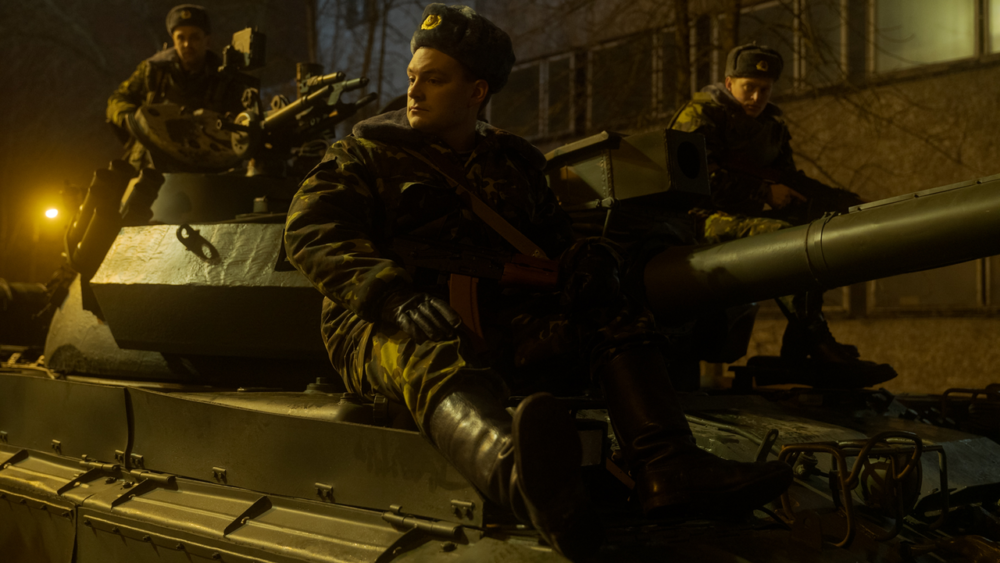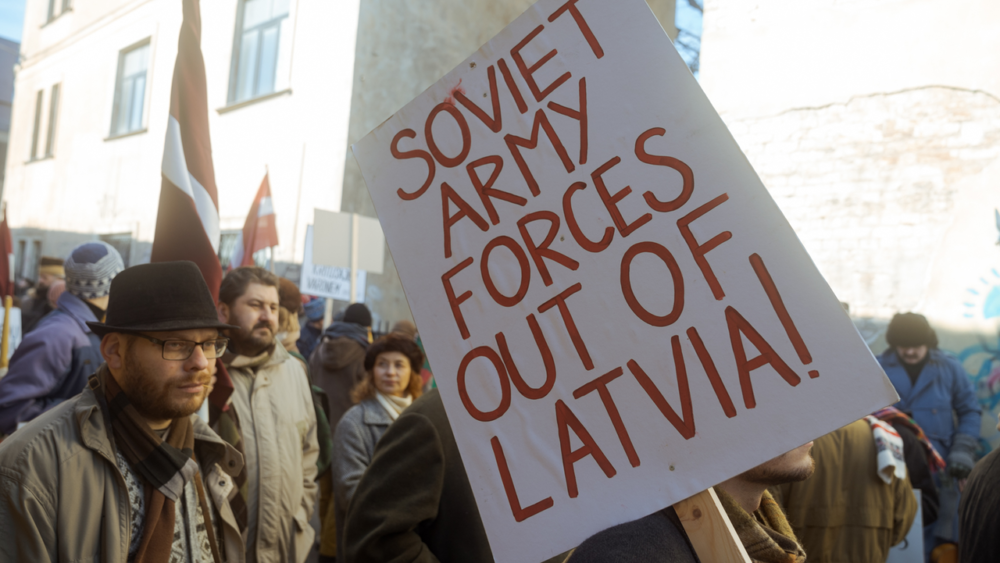Riga, Latvia. January 2, 1991. The OMON Special Units of the USSR Ministry of the Interior occupy the city’s press house to stop it from publishing papers supporting the Latvian independence. The tension between the USSR and the newly proclaimed Baltic states has never been higher.
Through a series of title cards, Viesturs Kairiss’ “January” (Latvian: Janvāris) provides enough context to the situation surrounding the Baltic nations fighting for their independence from the Soviet Union. Then, by using this unrest as backdrop as its protagonist goes on a quest to search for his identity; Kairiss invites the audience to an immersive coming-of-age story that’s one of the finest of the year thus far.
“January” introduces us to Jazis (Kārlis Arnolds Avots), an aspiring filmmaker whose personal heroes include Andrei Tarkovsky and Ingmar Bergman. For Jazis, there’s no better time to be alive than that January. He carries a Super 8 camera with him to film the OMON’s attacks at the press house to curtail its publication of purported anti-Soviet propaganda. And as the young man apparently wants a career in film (with Tarkovsky as inspiration), one can see why such goals might alarm any parent at the time.
Thankfully, Jazis’ parents support him with his pursuits. His anti-Communist mother, in particular, wants him to enroll in the film academy; this is so he could receive deferment from conscription. After all, the last thing any parent wants is losing a child from the horrors of war. Conversely, while his father still belongs to the Party, the latter agrees with his wife’s wishes for Jazis. He even checks Jazis’ camera and repairs it after his son comes home beaten by OMON special units.

Along Comes a Kindred Spirit
It takes just one other soul who understands your passion and its depth for you to realize you want to spend a thousand lifetimes with them. With Jazis’s talent in filmmaking growing by the day, he crosses paths with Anna (Alise Danovska); a pretty fellow film student whose drive toward artistic success matches that of his own. Awakening the passion from within him, the two begin a relationship that doesn’t last long; that same focus drives Anna away as she accepts a position working for famous filmmaker Juris Podnieks (Juhan Ulfsak).
With Jazis left alone and unsure as before whether he’ll amount to something, all his musings come to the fore. From telling his mother he’ll never be the ‘Latvian Bergman’ to discussing the merits of Jim Jarmusch’s “Stranger Than Paradise” with another acquaintance; Jazis’ search for who he really is and who he wants to be gradually becomes murkier as the tension between calls for subjugation and cries for independence reaches fever pitch. What was once a backdrop emerges at the forefront, even as Anna eventually returns to him—at the same time his lethargy gets awakened by said activism for independence.
“January”: An Unfortunate, Timely Tale of People Caught in the Crossfire
Working on a script he co-wrote with Andris Feldmanis and Livia Ulman, director Kairiss shows the measures the Soviet military takes on just to stifle any efforts to support the call for independence. Unfortunately, “January” resonates today, especially with the still-ongoing Russian invasion of Ukraine. How many Jazis are there, caught in the cross-fire, with their dreams and passion put on hold?
It becomes apparent by the time third act unfolds that Kairiss trusted his cast and crew a great deal. “January” boasts of an inventive approach to cinematography that ranks among the best in recent years. DP Wojciech Staron’s mix of shots in 8mm and 16mm gives the film a look and feel that’s just right for the era. More importantly, the aspect ratio Staron uses makes the viewing experience a little uneasy; which makes sense, given the oppressive nature of the climate in the story.
In addition, the chemistry that Avots and Danovska has feels very palpable. Audiences can feel the frustration when both have to take into account their own passion, and how the other person figures into their dreams—or if at all.
[Related News: Tribeca Festival Announces 2022 Jury Award Winners]

A Thought-Provoking Meditation on One’s Pursuit of Passion and Love in the Time of War
There’s a lot to love about “January”; primary of which is its honest portrayal of the collateral damage of the battlefield: the common folk with dreams put on hold. The interspersing between Super 8 and actual archival footage might be confusing at first. But then, it pays to remember that the film’s protagonist operates within the same realm of confusion. In the end, while this same approach of using war as backdrop can also be its downfall; the film nonetheless succeeds in intersecting art, love, and war, in levels that even Tarkovsky might appreciate.
 “January” premiered in this year’s Tribeca Film Festival, winning the award for Best International Narrative Feature.
“January” premiered in this year’s Tribeca Film Festival, winning the award for Best International Narrative Feature.
Support the Site: Consider becoming a sponsor to unlock exclusive, member-only content and help support The Movie Buff!

